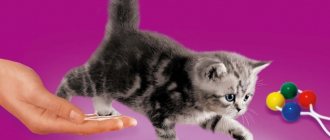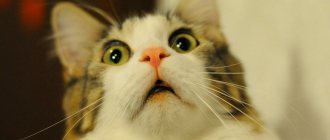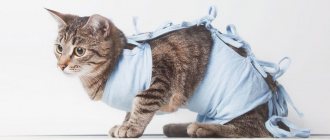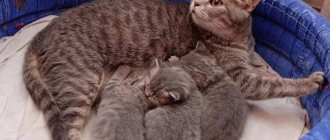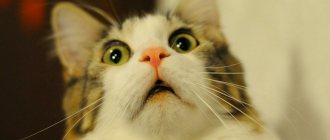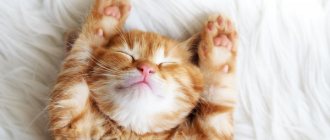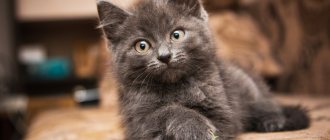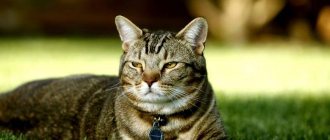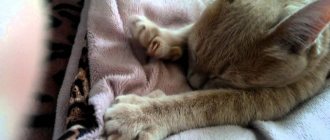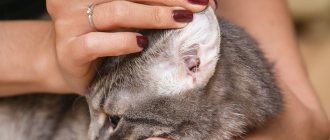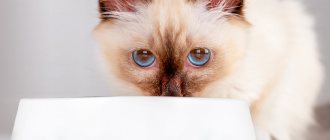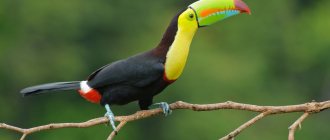What to do to make your cat's milk burn out
04.07.2018
To properly wean kittens from your cat, you need to do this gradually.
It is better to start weaning babies from mother's milk at 4 weeks. From this period, they begin to gradually introduce “adult” food, thereby teaching them to lap up liquids and chew solid food. A complete transition to adult food and cessation of breastfeeding is noted by 8-10 weeks. You should not separate kittens from your cat too early (before 4 weeks) or too abruptly.
You should wait until you acquire the basic skills to live independently and eat food other than mother's milk. The guideline for introducing solid food should be the opening of the eyes, standing firmly on the paws and the eruption of the first teeth - babies should be able to focus their eyes on the food, confidently approach it and try to chew.
How to tell if kittens don't have enough milk
The main criterion for a kitten to be full is sleep. In the first month of life, the baby wakes up only to satisfy the feeling of hunger. Therefore, well-fed kittens sleep most of the day, while hungry kittens scream, crawl away, or tug at their mother’s nipples for a very long time and intensively.
A kitten's satiety can also be judged by its body weight gain. On average, a healthy baby should gain at least 7-10 grams per day. If this indicator is significantly reduced, then you should consult a veterinarian or an experienced breeder about the possibility of complementary feeding.
Important! With mastitis, pathogenic microorganisms develop in the cat's milk, which enter the kitten's body and cause severe gastrointestinal disorders, which can be fatal. Therefore, it is necessary to isolate kittens from sick kittens and transfer them to artificial feeding.
How to teach to eat liquid food from a saucer?
It is better to provide a special milk formula for kittens as food during weaning hours. Giving cow's milk is not recommended due to frequent cases of indigestion, diarrhea or constipation.
It is strictly not recommended to put a kitten's face in a saucer with formula/milk - the baby may inadvertently inhale droplets of liquid and develop pneumonia.
The owner should dip a finger into the liquid and touch the kitten's lips with it. The kitten must lick itself. Repeat the procedure until he begins to lick milk directly from his finger. Then dip your finger in the saucer and hold it there until the kitten comes to the saucer and starts lapping up the milk right from there next to the finger.
When and how to switch to solid food?
They begin to offer solid food only after babies confidently begin to drink from a saucer. You can offer special balanced food for kittens or make a paste with the consistency of oatmeal from crushed dry food and milk (infant formula). You should bring a finger lubricated with gruel to the kitten’s lips and give him the opportunity to sniff the food. Then you should smear the lips, lightly pushing the food into the mouth. Wait until the kitten tastes, chews and licks. Then you can bring it to the saucer with food and wait until the baby sniffs it out on its own and starts eating without outside help.
After the kittens begin to fully eat only “adult” food, go to the toilet in a tray and can do without the cat’s mother for a long time (age 10-12 weeks), then the offspring can be distributed into the wrong hands.
How to stop lactation in a cat
This way, lactation subsides gradually naturally, without complications or the use of medications. During this period, the mustachioed predator is transferred to a special diet.
If there is a need to wean all the kittens at once, then 2-3 days before the expected event the cat is given a sedative, because This will be a huge stress for the animal. Usually prescribed:
- Kot Bayun solution: 5-7 days 3-4 times a day, 2 ml per dose;
- Kot Bayun tablets: 1-2 tablets per week. up to 4 doses per day 45 minutes - 1 hour after eating food or 25 minutes before;
- Fitex: 3-5 drops up to 3 times a day for 2-4 weeks.
Medication methods
If folk home remedies do not help, you should contact your veterinarian. After conducting the necessary research, the doctor will find out the reason for the body’s reaction and will be able to select suitable tablets or injections that can stop the process.
In no case should you do anything on your own when choosing a drug, since each of the drugs has its own indications and contraindications, so in each case the medicine is selected individually.
The most effective and safest are:
- Galastop.
- Ovariavit.
- Parlodel.
- Bromocriptine.
When used in the correct doses, taking into account the recommendations of doctors, medications will quickly solve the problem of excess lactation, no matter what causes it. However, if such situations have already arisen more than once, it is worth conducting a full examination of the dog, since lactation that is too long and does not stop naturally is uncharacteristic for these animals and may indicate a developing disease.
Question answer
The cat pushes the kittens away and does not allow them to suckle
This is observed if a nursing female has problems with the mammary gland, or when the mother cat herself decided to wean her offspring from breastfeeding. It is necessary to examine the cat's mammary glands. If there are no signs of disease, and the kittens are still not allowed to breastfeed, you should somewhat speed up the process of switching to solid food. It is necessary to ensure that the cat does not injure the kittens in the process of driving them away. It is better to seat them in different sleeping places yourself.
The cause may be a foreign smell from kittens. If babies are often held in your arms, have been stroked by hands after washing with strong-smelling soap, or their fur has absorbed the smell of perfume when cuddling them to the chest, the cat will not let them near you. It is necessary to put the kittens in their usual sleeping place so that they are “saturated” with the usual cat smell and everything will fall into place.
If kittens stop eating solid food after weaning
Perhaps this is how post-weaning stress manifests itself. It is necessary to be patient when starting to feed the kittens again with milk (from a syringe or saucer yourself), starting to introduce complementary foods with minimal portions.
The cat is looking for kittens after weaning and distribution
Weaning doesn't just take its toll on the kittens—cats are also stressed about losing their babies. Ideally, a cat is always left with one kitten until lactation completely subsides. If this is not possible, you can try two options - placing a toy in the sleeping area or distracting the cat at the moment when she begins to walk around the house and meow, clearly inviting her babies (give a treat, play, pick up, stroke, let out). and so on.). It takes time and patience from the owners until the cat gets used to being alone.
It is also advisable to replace the bedding in the sleeping box and move (or completely remove) it to another place.
After the kittens were weaned, feces began to be found everywhere.
While the babies are small and feed only on milk, the mother cat licks their tummy after eating, doing a kind of massage and licking the excreted primary feces and urine. Obviously, after switching to adult food, kittens' feces become more and more formed and look like adults. The cat no longer eats it. The period begins when kittens are trained to use the tray. If after some time you put the babies in the tray and wait for them to do their “natural” business, the feces will no longer be detected.
Cat's milk and its importance for newborn kittens
The importance of cat milk for newborn kittens. We try to provide newborn Maine Coon kittens with optimal nutrition, and what could be better for kittens than fresh cat milk?! There are huge benefits to breastfeeding, and kittens fed on mommy cat's milk are healthier than kittens fed kitten formula. Infant formula for kittens cannot fully replace mother's milk. First of all, natural milk contains maternal antibodies that protect against infections and diseases. Sufficient, proper nutrition of the baby is the key to his health and timely development. Mother's milk helps the kitten's body resist gastrointestinal disorders, allergies and infections, it is the best food from a psychological point of view, because it provides close contact with the mother cat, which is necessary for the normal development of the kitten, it grows calm, affectionate, kind, sociable. Biowaves emanating from the mother cat strengthen the energy of the kittens. Breastfeeding by a mother has a beneficial effect on both the baby and the body of the nursing mother.
Mother's milk contains not only easily digestible nutrients, but also so-called functional components that stimulate the development of the baby's body and protect it from various diseases in adulthood. Kittens depend on the cat for milk, antibodies, warmth and affection, care and hygiene. transfer your heat to them to maintain their normal temperature, which they cannot regulate on their own. While feeding the babies, a mysterious relationship arises between the cat and her babies. The cat knows and loves her kittens. In the first days, she is with the newborns almost all the time, leaving only for a short time. The cat devotes all her time to caring for the kittens; she carefully licks the babies, removing the kittens’ bowel movements and maintaining cleanliness in the nest. She licks their bellies, massaging them and thereby stimulating blood circulation and digestion. Licking kittens is not only a hygienic procedure. Cat saliva can kill germs because it contains very valuable substances.
Colostrum or colostrum, milk that is formed in a cat during the first 1-2 days after the birth of offspring, combines in its composition in the most optimal proportions several groups of biologically active substances, which are very important for the proper development and growth of the child.
Colostrum contains nutrients:
Vitamins and minerals, essential regulators of all life processes; digestive enzymes, which help the newborn’s digestion, which is extremely important, because the growth and development of the kitten directly depends on the efficiency of nutrient absorption; prebiotics, ensuring the growth and normalization of intestinal microflora; nucleotides, regulatory substances, without which the synthesis of DNA and proteins is impossible; amino acids, i.e. “building blocks” from which the proteins themselves are already built, for example, colostrum is rich in the amino acid taurine, the presence of this amino acid is necessary for the development of the brain, heart and muscles; interferons, transfer factors - unique molecules of “immune memory”, maternal immunoglobulins, which protect the kitten’s body from infections, i.e. Antibodies are protein molecules that help destroy bacteria, viruses and other foreign substances; growth factors are natural substances that in a child’s body regulate the growth and proper development of all organs and systems, stimulating cell renewal; endorphins are unique physiological substances that protect the body from a variety of stresses and increase resistance. The concentration, physiological effectiveness and, what is important, the duration of action of biologically active substances in colostrum are so high that during these 1-2 days they stimulate the development of the baby’s own body systems and create a reserve of vitality for the future. Colostrum differs from mature milk in water and nutritional content and has everything that is especially important for the survival of newborn kittens.
How to stop lactation in a cat - what should the owner do to help his pet?
When the kittens have already matured and it’s time to place them in a new home, the owner is faced with the task of stopping the cat’s lactation. It is important to do this correctly, not abruptly, otherwise you can harm the cat’s health. To reduce the amount of milk and soon stop its secretion altogether, they use special preparations and also control the animal’s nutrition. Inexperienced owners are advised to read the information about what not to do during the period of cessation of lactation.
What to do?
The safest way to stop lactation is to wean one baby every 3-4 days. This is how the cat gradually loses milk, while the body does not experience stress, because the situation is as close as possible to natural. But it happens that it becomes necessary to take away all the babies at once. Such actions negatively affect the cat’s health, leading not only to a deterioration in well-being, but also to severe stress.
To help the cat cope more calmly with the separation, veterinarians prescribe special sedatives:
Nutrition and daily routine
Separation of a cat from her kittens is a huge stress for both mother and babies. Due to nervous overload in a cat, the risk of developing lactostasis or milk stagnation increases. Therefore, to make it easier for your pet to cope with separation and not sacrifice its health, veterinarians recommend preparing the animal for such an event in advance.
2-3 days before weaning the kittens, it is necessary to reduce the amount of liquid the cat consumes. The same should be done with dairy and protein-containing products. During this period, it is useful to give the cat porridge, preferably buckwheat, and vegetable soups. The cat should be fed such products until the last kitten is picked up, plus another 2-3 days. It is important to constantly monitor the cat’s well-being, and if it is normal, low-protein dishes can be introduced into the menu already on the 3rd day. While the milk burns out, it is important to keep your pet on such a diet. Palpation of the nipples will help you understand that there is no milk left in the mammary glands. They decrease in size, and when you try to express the liquid, nothing comes out of them at all.
Drugs
Medications that help stop lactation are used only in extreme cases, for example, if all babies need to be weaned at once. Despite the fact that each product has instructions for use, you should not self-medicate, but contact a veterinarian who will select a safe dose and regimen of use, taking into account the individual characteristics of your pet. To make milk burn out faster, the following drugs are often prescribed:
While taking any medication, your cat may experience side effects such as nausea and vomiting. However, you should not stop the course of therapy on your own, otherwise the risk of developing new complications increases.
Mastopathy
Chronic mastitis can cause mastopathy.
It is generally accepted that the main cause of mastopathy is hormonal disorders. However, this pathology can occur as a complication of chronic mastitis.
Clinical signs
The main symptoms are associated with enlarged mammary glands.
- The provoking cause, the factor of which is a stagnant process, is characterized by fibroepithelial hyperplasia of a diffuse form .
- The entire area increases in size with the presence of multiple compactions, and not only individual compactions are painful, but also the entire inflamed area.
- If ulcers begin to appear, help will be very difficult and the effectiveness of the prescribed treatment will remain in question.
If a cat is diagnosed with an advanced form of the disease, the only way to help it is through surgery.
A serious lesion entails surgery with partial removal of the affected bags or a complete mastectomy , which involves removal of the uterus along with the ovaries.
Such a radical method is required when the form is advanced, when there is nothing else to help the pet.
In milder cases, iodine-containing drugs, anti-inflammatory drugs, homeopathic medicines, and immunomodulators are used.
The kittens were taken from the cat
The cat shows concern, is looking for babies, and is worried. What to do? What actions to take if a cat is looking for her kittens?
Try to give the animal more attention and affection. For the future, it should be taken into account that the optimal age for kittens to separate from their mother is 2.5 months. Both the cat and the children will be psychologically ready for separation, and the mammary glands will be ready for natural involution. To minimize the stress of separation from kittens:
You can arrange another cozy nest for your cat, a refuge, or buy a new toy if she is playful. Eliminate additional stress factors, such as contact with strangers, noise, or the departure of the owners.
Medical assistance on time
The behavior and condition of a pet left without kittens will not go unnoticed. The cat lets out a plaintive meow, rushes about, and tries to take a tastier piece to various “hiding places.” Breast engorgement and loss of appetite are also possible. Don't underestimate this condition. A timely visit to the veterinarian will most likely result in the prescription of sedatives, and may possibly prevent more serious problems in the future.
It happens that a cat that has given birth a long time ago behaves just like a new mother. First of all, you need to make sure that your pet does not have a hormonal disorder. Taking samples and examining a veterinarian will help make a diagnosis. If future plans do not involve breeding kittens, it is more humane to sterilize the animal, in the absence of contraindications, so as not to put stress on its reproductive system and nerves.
If there's a problem
If a disaster occurs: the cat’s birth ends unfavorably, the body informs the animal’s brain that she was about to give birth to kittens. Having taken care of the absence of postpartum complications, do not forget about the psyche of the animal that has experienced a severe shock.
Source
